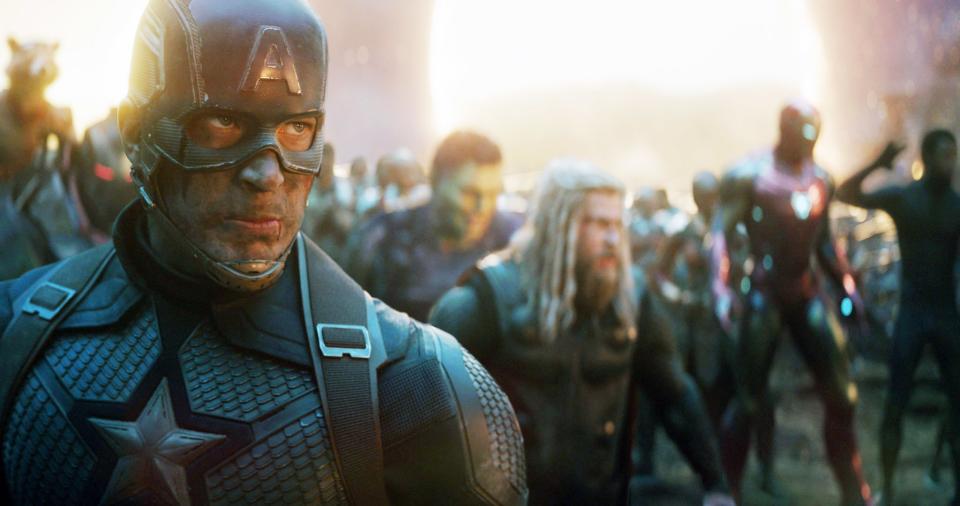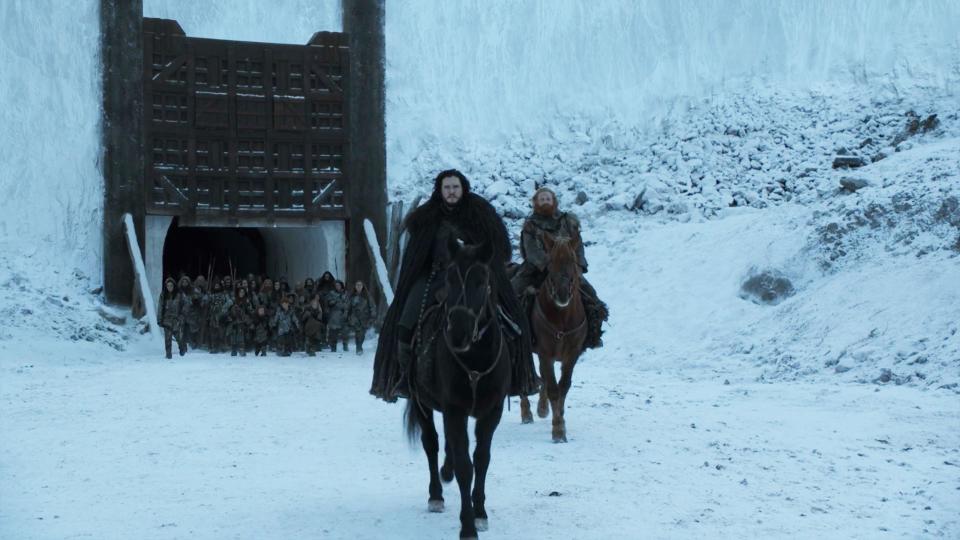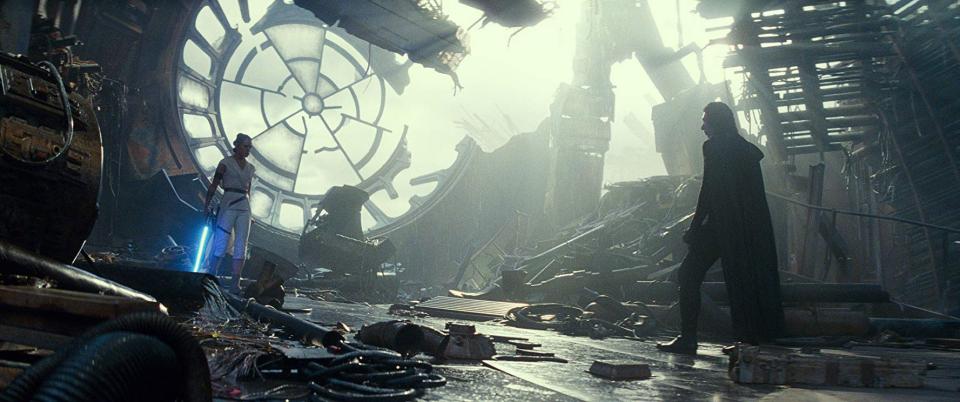Star Wars, Game of Thrones , and the MCU: 2019’s Finales Proved Nothing Will Ever Really End
Jon Snow, flanked by the Wildlings, leaves his home and his birthright behind as he rides beyond the Wall, ready for whatever may come. Star Wars's Skywalker Saga draws to a close, presumably accompanied by a heart-wrenching swell of John Williams’s iconic strings before the familiar theme kicks in for the final time. Captain America, having saved the universe from Thanos’s wrath, ponders those he lost and dances with the love of his life—a life he never really got to lead.
But is it really the end? In 2019, three of the biggest pop culture franchises of all time, and arguably the last three that have managed to fully capture the public’s attention in an increasingly splintered entertainment landscape, brought their stories to an end. The year just isn’t the end of a decade, it’s the end of years—generations, even—of stories. But there’s a hollowness to 2019’s big finales, because even when it’s over, there’s no end in sight.
The Marvel Cinematic Universe, Star Wars, and Game of Thrones all ended with their fair share of promotion and fanfare, even as the corporate powers behind them teased the next decade of exciting stories set in Westeros, or a galaxy far, far away. It’s a weird feeling, not so much having our cake and eating it too, but finishing our cake while the chefs assure us that more cake is on the way. What 2019 asks, essentially, is: can you celebrate an ending without finality?

If we’re splitting hairs, the Marvel Cinematic Universe had the most honest “ending” of the three major franchises. Because there was never any doubt that the MCU would continue long, long after Avengers: Endgame. What exactly the future of the franchise would look like wasn’t totally clear, but for starters, we all know that Disney is making a Black Panther sequel. Despite the title, Endgame never really claimed to be the end of the MCU at all, but it was undeniably the end of an era. Robert Downey Jr. and Chris Evans, as Iron Man and Captain America, respectively, have been the heart and foundation of the franchise for a decade, and they won’t be in whatever comes next. And Thanos, the larger threat who loomed behind nearly two-dozen films, is dead twice-over (and the guy who played him is busy… well, we’ll let you see what he’s up to for yourself).
That story is over, but the stories of Thor, Black Panther, the Guardians of the Galaxy, and several other heroes will continue on. And there will be new heroes too. Chances are we’ll be watching their adventures on the big screen (and on Disney+) for another decade to come, and probably beyond, considering the merchandising and theme park value associated with the valuable franchise. The Fox-run X-Men franchise essentially ended in 2019 as well, but Disney’s acquisition means that we’re bound to get those characters in the MCU going forward. Time is a flat circle filled with superheroes you’ve never heard of. Get used to it.

The ending of Game of Thrones is widely considered to have been pretty terrible, so perhaps it’s good news that the “real” end still hasn’t come. Sure, given George R. R. Martin’s glacial writing pace, the final two books in The Song of Ice and Fire might not come out for a long time, putting fans in a sort of blue-balled ending limbo. But HBO is reportedly preparing one spin-off series about the Targaryens’ rule of Westeros, and there’s certainly a strong possibility that more shows will follow—when there’s money still to be found on the money tree, why would you walk away? Every other network is trying to make the next Game of Thrones, after all, but only HBO is able to literally just do that. So, naturally, it will.
Star Wars technically hasn’t ended yet, as Episode IX — The Rise of Skywalker won’t premiere until just before Christmas, but the film is being heralded as the finale of the generation-spanning Skywalker Saga. But think about it: Lucasfilm was only just acquired by Disney this decade. Both U.S. Disney theme parks only just opened Galaxy’s Edge, their expansion lands based on the Star Wars galaxy. There will be more Star Wars to fight over, even if the studio is reevaluating exactly what movies it wants to make going forward (pour some out for David Benioff and D.B. Weiss’s trilogy).
Despite all the promotion and hype, the coming churn of content from these valuable IPs will make 2019 feel, at best, like a comma rather than a period. At worst, we’ll look back at this year as the one when everything pole-vaulted over the shark. It’s depressingly easy for “the last movie” in a series to become “the last good movie.” The drive to keep a story going in a perpetual state, well into the next decade, deprives both characters and viewers from a real sense of finality; it makes you question why you took the journey in the first place, because the uplifting satisfaction of a happily ever after ending isn’t quite the same when you know an upcoming spin-off is going to explore how, actually, it wasn’t that happy after all.

It might be easier to accept that, say, the Skywalker Saga is done, but new stories in the Star Wars Universe will still be told if it wasn’t for the way the past decade has warped the way we talk about fiction—especially genre fiction. Stories are to be solved; connections drawn like a lunatic conspiracy theorist’s string-covered corkboard. What does an Easter egg in the Disney+ Obi-Wan Kenobi series mean for Luke Skywalker? Will Tony Stark make a cameo in Black Widow? How does Fire and Blood change what we thought we knew about Daenerys Targaryen’s madness? The conversation around fiction, to say nothing of the entertainment media ecosystem around it, is geared towards connecting everything, making beginnings and endings fundamentally unnecessary because we’re instead looking for ways a work will set up what’s next or retcons what happened. Where’s the fun in that?.
This instinct to always wonder what’s next is coloring other franchises that ended this year that aren’t explicitly continuing. How to Train Your Dragon: The Hidden World was the clear end to what was quietly one of the better trilogies in recent memory, yet if you search “How to Train Your Dragon 4,” there are plenty of search-engine-optimized results speculating what possible stories could be told in a fourth movie, nevermind that there’s been no real-world indication that such a film is in the works or ever will be. If even a franchise that actually, for real, ended is getting mined for revisionist plot points and possibilities for phantom sequels, can you even try to bring something to a conclusion?
The end of the year usually signals when all the “Best of” lists start popping up (reader: find ours here—you can’t blame us for hustling!) but this year, there are a ton of “Best of the Decade” lists too. If you look around on social media, it’s not hard to find legions of contrarians complaining that determining the best of anything over a 10-year period is a pointless effort because a decade is an arbitrary, made-up measurement. While GQ thanks you for reading our EoD content, these naysayers have a point. Time doesn’t cleanly end like the closing of a chapter.
Stories, however, do. Or at least, they used to. This past year, and the looming sequels and spin-offs on the horizon, make the endings of these beloved franchises feel a little like the end of the decade—arbitrary and kind of made up. The Game of Thrones spin-off is just the 2020 to the original series’ 2019. What should have felt like a definitive moment is revealed to be yet another data point in a series with no end in sight.
Perhaps it’s ironically fitting that 2019 also saw the premiere of HBO’s Watchmen series, which is a continuation of an iconic graphic novel that creator Alan Moore famously did not want to ever be adapted or get a sequel. Towards the end of the comic, after unleashing death and destruction in the name of a greater good, the antihero Adrian Veidt asks the near-omnipotent blue superhuman Doctor Manhattan if he did the right thing in the end.
“Nothing ever ends, Adrian,” Doctor Manhattan replies, as if using his abilities to see the real-world future of Watchmen and pop culture at large. “Nothing ever ends.
Disney+ and Apple TV+ are both playing an entirely new ball game.
It was a year of peak storytelling, cruel cancelations, and a whole lot of new.
Those GIFs you see littering Twitter might be putting a dent in the armor of the Golden Age of TV.
Originally Appeared on GQ




